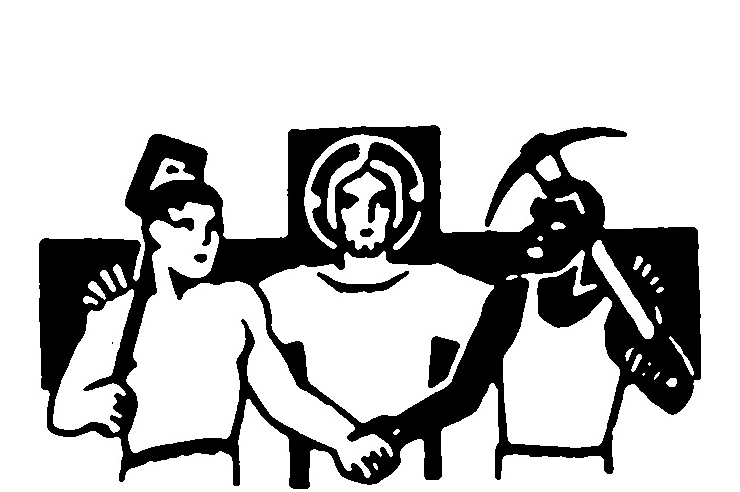Reflections on Romero Day in El Salvador.
Published in the August/September 2002 issue of The Catholic Worker.
A Reflection from Fr. Jon Sobrino’s “Letter to Monseñor Romero,” March 22, 2002. (Trans. Mark Engler)
“To canonize someone, that person needs to have made a miracle — which is to say, something that defies the laws of nature, something that can come only from God. And so the question occurs to me: Is this the best way, the clearest way, that God reveals himself as God? I believe that the God of Jesus did something different. He showed himself, more than anything, with compassion and love for the poor, by welcoming the marginalized and the sinners. And that love is powerful. I do not know if it breaks the laws of nature. But it has the power to make us human: to change hearts of stone into hearts of flesh, affliction into joy, marginalization into family, lies into truth, weakness into commitment, and even — in many cases — to give life. Is this not God’s greatest ‘miracle’?”
Twenty-two tears ago, before he was assassinated in the Cathedral of San Salvador after giving mass, Archbishop Oscar Romero sent an urgent letter to U.S. President Jimmy Carter. Appealing to the President’s “religious sentiments and… feelings for the defense of human rights,” he demanded: “stop sending aid to the military here, because they use it only to kill my people.”
Today, those honoring Romero’s memory and carrying forth his mission of combating poverty and injustice in El Salvador have a new message for President George W. Bush: Stop the Central American Free Trade Agreement (CAFTA) and other neoliberal economic policies that punish the poor.
Earlier this year, President Bush traveled to El Salvador to help “modernize its economy” and to promote pro-corporate “free trade” measures like CAFTA. While Bush has never been known for his mastery of the finer points of geography and foreign affairs, Salvadorans were outraged that he scheduled his visit on March 24, the day normally reserved for commemoration of Romero’s death. In San Salvador thousands marched both to protest Bush’s advocacy of an elite economic agenda and to remember the life of the martyred Archbishop, a stalwart defender of the country’s poorest citizens.
In an article with Miguel Cavada Diez, well-known liberation theologian Jon Sobrino, S.J. wrote that “the visit has produced indignation in many over the incredible insensitivity in the choice of the date. Did not they train in the United States many of the military criminals whom Monse?or Romero denounced? Did not the United States support some of the same groups that produced Romero’s assassins? No one should be surprised that there are protests.”
The bloody war in El Salvador ended ten years ago, with the signing of the Chapultepec Peace Accords. However, policies supported by the United States continue to thwart efforts to promote human rights in that country. Washington DC-based financial institutions like the International Monetary Fund and the World Bank often make cooperation in various “structural adjustment” schemes a necessary condition for countries to receive development assistance. In this case, U.S. economists applauded the conservative Salvadoran governments of the 1990s as they slashed social services and privatized public assets in utilities and telecommunications. While newly-private enterprises raised costs for consumers, the government helped union-busting businesses push wages in the “modernizing” economy toward sweatshop levels. Early this year it decided to cut 10,000 jobs in the public sector, a huge number that will send ripples throughout El Salvador’s small economy.
The same communities most affected during the country’s time of violence have been victimized by this type of economic transformation. According to the United Nations Development Program, El Salvador has among the starkest levels of income inequality in the world — and they are growing. Even self-interested government officials acknowledge that half of the country lives in poverty. Responding to these difficult realities, many Salvadorans rely upon money sent back from relatives in the United States — the same immigrant workers who are consistently mistreated in this country — to make ends meet.
Hector Dada Hirezi, a leading commentator and past member of a transitional national government, recently responded to ruling-party statements suggesting that the safety net created by family remittances is a positive outgrowth of their economic and political policies. “What kind of economic policy,” he said, “is based on the exodus of the population, rather than creating a country in which the Salvadoran people will want to stay and build their future.”
Early this year, George W. Bush indicated that CAFTA would be a top item in the U.S. economic agenda. This treaty would bring the five countries of Central America into a NAFTA-style free trade agreement with the United States. Such an agreement would weaken national sovereignty, push further privatization, and increase the power of multinational corporations. As barriers to their mobility decrease, these companies perpetuate a “race a bottom” — continually threatening to move production to areas with the fewest protections for workers’ rights and the environment. Moreover, a flood of U.S. imports would inhibit local businesses from developing in the country which could provide dignified work for the Salvadoran people.
During his life, Romero was not opposed to aid from the United States. But he insisted that aid genuinely benefit the most needy and not “limit the Salvadoran people’s legitimate right to self-determination.” Unfortunately, the neoliberal economic agenda that George W. Bush is pursuing does the latter — it traps people in the developing world into a plan for development that favors wealthy investors and weakens democratic decision-making. Within the Catholic Church, those working to honor Romero continue to advocate for the Archbishop’s canonization. But religious and lay people alike celebrate his memory as they rebuke President Bush’s version of “modernization” and envision a more just international economy.
